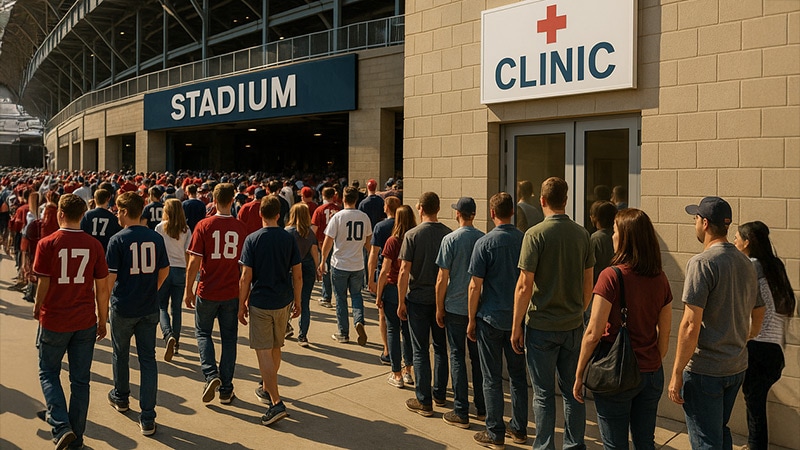Almost 70% of participants screened at a large-scale pop-up community health event had at least one uncontrolled risk factor for cardiovascular disease, according to a recent study in the Journal of the American College of Cardiology, and presented simultaneously at this year’s scientific meeting of the Cardiac Society of Australia and New Zealand.
The community screening event was focused on atherosclerotic cardiovascular disease, a leading cause of cardiovascular death that is driven largely by modifiable risk factors. Despite advances in detection and treatment, many remain unaware of their risk.
“This is a missed opportunity to prevent a heart attack,” said Stephen Nicholls, MBBS, PhD, director of the Monash University Victorian Heart Institute in Victoria, Australia, and senior author of the study. “Prevention is key, and prevention begins with knowing your numbers.”
A Cricketer’s Death
As part of the Shane Warne Legacy Health Test initiative, researchers conducted a prospective, observational cohort study from December 15, 2023, to January 31, 2024, to evaluate the effectiveness of a large-scale, opportunistic pop-up screening approach. Shane Warne, a popular Australian cricket star, died suddenly in 2022.
The screening initiative involved computerized health stations (SiSU Health) and was heavily promoted to the public in advance of the event. Stations were installed in a total of 311 community pharmacies across all eight Australian states and territories, as well as at a stadium during a 4-day international cricket test match.
The stations recorded the participants’ physical characteristics, lifestyle factors, and a brief medical history. Regardless of the screening results, all participants were encouraged to visit their physician for a complete physical examination.
Findings ‘Unfortunately’ No Surprise
A total of 76,085 people were screened during the 7-week study, with almost 90% of screenings occurring at pharmacies. Nearly half of the participants (45.3%) were aged 45 years or older, and about 5% of all attendees at the sporting event took part in the screening.
The majority (68.9%) of those who underwent screening had at least one uncontrolled cardiovascular risk factor, and 26% had two or more. The most common (60.5%) risk factor was an increased BMI, followed by elevated blood pressure (37.2%) and being a current smoker (12.1%).
“Unfortunately, these findings did not surprise us at all,” Nicholls said. “We know that cardiovascular disease is common, there is a large burden of risk factors in the community, and much of the [burden] is unknown.”
People who were screened at the sporting event were more likely to be men (77% vs 49.7%), to be between ages 35 and 64 years (60% vs 44.9%), and to have an uncontrolled risk factor (79.9% vs 67.7%) than were those screened at a pharmacy. Of those at the sporting event with elevated blood pressure, about half said they had not had a blood pressure measurement within the past year, and approximately 80% said they were not taking an antihypertensive medication.
The researchers noted individuals who were screened had only a brief period of rest before the blood pressure measurement, and the consumption of alcohol and the overall excitement of the event may have affected some of the results.
Among those who were screened in a pharmacy setting, those living in rural regions had a greater burden of diabetes (6.2% vs 5.1%) and were more likely to have an uncontrolled risk factor (72.4% vs 66.2%) than were residents of more rural areas of the country.
While younger women were more likely to undergo screening at a pharmacy during daytime hours, and older men were more likely to be screened at the sporting event, a notable anomaly was observed for older men who were screened at pharmacies during the sporting event.
“They were getting the message while watching the [event on] TV, and they showed up,” Nicholls said.
Playing the ‘Long Game’
While not necessarily on the same scale as the Australian screening event, targeted community screening initiatives can be found across the US. For the past 2 years, the American College of Cardiology (ACC) has held community health screenings as part of its annual meeting. The events are typically promoted to underserved groups with historically low rates of screening and high rates of heart disease.
Through the Caring Hearts Initiative, the ACC also partners with Higi, a technology company that manufactures screening kiosks similar to those used in the Australian study.
“Since we’ve started that initiative, we’ve screened at least 13,000 people,” said Melvin R. Echols, MD, MSCR, the Chief Diversity, Equity, and Inclusion Officer at the ACC and associate professor of medicine at the Morehouse School of Medicine in Atlanta.
Adam Berman, MD, MPH, a cardiologist at the NYU Grossman School of Medicine in New York City and one of the authors of an editorial accompanying the Australia study, said that for a large-scale screening initiative to be successful, there needs to be a concerted effort to prioritize prevention of cardiovascular disease.
“It’s about playing the long game, which is something that we can only see a benefit from years down the line,” Berman said. “But prevention is the key to broadly improving cardiovascular population health.”
Nicholls, Echols, and Berman disclosed having no relevant financial conflicts of interest.
Paul Basilio is a freelance writer and editor based in Glenside, Pennsylvania.
Source link : https://www.medscape.com/viewarticle/large-scale-heart-screening-finds-widespread-risk-factors-2025a1000lzx?src=rss
Author :
Publish date : 2025-08-20 12:21:00
Copyright for syndicated content belongs to the linked Source.
